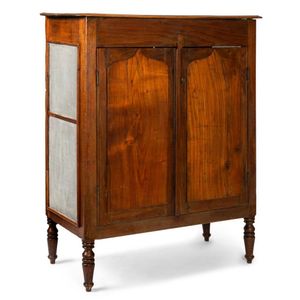Tasmanian Blackwood Meat Safe with Shield Doors
A Colonial blackwood meatsafe with shield doors, turned legs and zinc sides, Tasmanian origin, 19th century 123 cm high, 103 cm wide, 47 cm deep. provenance: The Rodney Pemberton Collection
You must be a subscriber, and be logged in to view price and dealer details.
Subscribe Now to view actual auction price for this item
When you subscribe, you have the option of setting the currency in which to display prices to $Au, $US, $NZ or Stg.
This item has been sold, and the description, image and price are for reference purposes only.
- Provenance - A term used to describe the provable history of an antique or work of art, and thus an additional aid to verifying its authenticity. Provenance can have an inflating effect on the price of an item, particularly if the provenance relates to the early settlement of Australia, a famous person, or royalty. Less significant are previous sales of the item through an auction house or dealer.
- Blackwood - One of the best known and most widely used Australian timbers, blackwood (acacia melanoxylon), is a member of the Acacia (wattle) family and grows in eastern Australia from about Adelaide in South Australia, as far north as Cairns in Queensland.
The largest, straightest and tallest trees come from the wet forest and swamps of north-west Tasmania where it is grown commercially.
Blackwood timber colours range across a wide spectrum, from a very pale honey colour through to a dark chocolate with streaks of red tinge.
The hardwood timber has been commonly used in the production of furniture, flooring, and musical instruments in Australia from the late 19th century. However, the straight grain timber is not the most prized or valuable, that honour falls to blackwood with a wavy, fiddleback pattern, which is used both in the solid and as a veneer. Fiddleback was only used on the finest examples of furniture. - Turning - Any part of a piece of furniture that has been turned and shaped with chisels on a lathe. Turned sections include legs, columns, feet, finials, pedestals, stretchers, spindles etc. There have been many varieties and fashions over the centuries: baluster, melon, barley-sugar, bobbin, cotton-reel, rope-twist, and so on. Split turning implies a turned section that has been cut in half lengthwise and applied to a cabinet front as a false decorative support.
- Turned Legs - are legs which have been turned on a lathe. In use from the 16th century, turned legs on tables, chairs and cabinets became more frequent until, by the 1830s, the Georgian square or tapered leg was rarely found except in country pieces.
This item has been included into following indexes:
